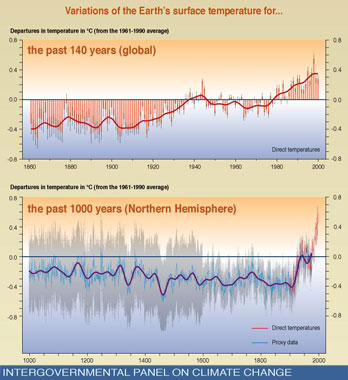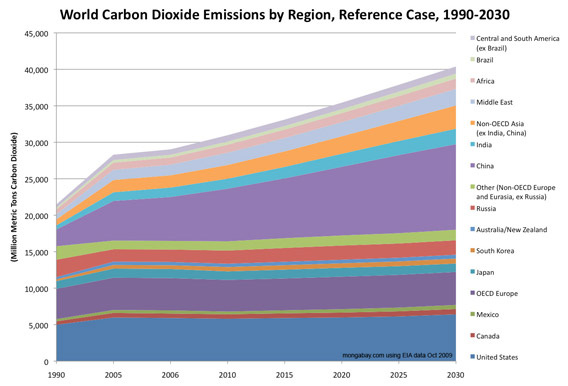Scientists, policymakers strike back against ‘denialists’.
It may be that climate change scientists and policymakers have simply had enough, and it may be that the emails which were hacked did not reveal the massive conspiracy that they were supposed to, either way climatologists and politicians have gone on the offensive against claims that the hacked emails from the East Anglia’s Climate Research Unit are evidence that climate change is a conspiracy or hoax.
Showing perhaps how frustrated world leaders are with the situation, the Prime Minister of the UK, Gordon Brown, heavily criticized climate change deniers in the Guardian: “With only days to go before Copenhagen we mustn’t be distracted by the behind-the-times, anti-science, flat-earth climate sceptics. […] We know the science. We know what we must do.”
The UK’s Secretary of State for Energy and Climate Change, Ed Miliband, told the Guardian that “the approach of the climate saboteurs is to misuse data and mislead people. The sceptics are playing politics with science in a dangerous and deceitful manner. There is no easy way out of tackling climate change despite what they would have us believe. The evidence is clear and the time we have to act is short. To abandon this process now would lead to misery and catastrophe for millions.”
 Intergovernmental Panel on Climate Change (IPCC) graph showing that surface temperatures for the past 140 years (global) and the past 1000 years (Northern Hemisphere). |
While researchers have admitted that the hacked emails have been embarrassing for some scientists and may show a need for more transparency, they adamantly say that the emails have done nothing to change the science.
“[Climate change denialists] have engaged in this 11th-hour smear campaign where they have stolen personal e-mails from scientists, mined them for single words or phrases that can be taken out of context to twist their words and I think this is rather telling,” Michael Mann, director of the Earth Systems Science Center at Pennsylvania State University and a victim of the hacking, said, adding that “those advocating inaction don’t have the science on their side.”
For example, while the media jumped on the use of the word ‘trick’ in one e-mail as evidence of climatologists manipulating, the term trick is common parlance for scientists (and appears in numerous scientific studies) as meaning a trick of the trade—a useful tool—rather than any attempt to deceive or conceal.
The Intergovernmental Panel on Climate Change (IPCC), the UN’s panel on climate change, has said it is “firmly standing” behind its findings. The IPCC’s research has been widely publicized and is the backbone of climate change science.
In a statement the IPCC said that these findings are “based on measurements made by many independent institutions worldwide that demonstrate significant changes on land, in the atmosphere, the ocean and in the ice-covered areas of the Earth,” while […] the internal consistency from multiple lines of evidence strongly supports the work of the scientific community, including those individuals singled out in these e-mail exchanges.”
Even the Washington Post, which has come under fire from climatologists for publishing several op-eds by George Will denying climate change, has stated that “none of [the emails] seriously undercuts the scientific consensus on climate change” and “by our reckoning — and that of most scientists, policymakers and almost every government in the world — the probability that the planet will warm in the long term because of human activity is extremely high, and the probability that allowing it to do so unabated will have disastrous effects is unacceptably large”.
Also in the Washington Post, science historian and author of The Discovery of Global Warming,
Spencer Weart, calls the belief in a conspiracy on climate change “extraordinary and, frankly, weird”. He explains that “in blogs, talk radio and other new media, we are told that the warnings about future global warming issued by the national science academies, scientific societies, and governments of all the leading nations are not only mistaken, but based on a hoax, indeed a conspiracy that must involve thousands of respected researchers”.
Weart warns that the denial movement represents something new in the history of science: “we’ve never before seen a set of people accuse an entire community of scientists of deliberate deception and other professional malfeasance. […] Even the tobacco companies never tried to slander legitimate cancer researchers.”
While climate change deniers have been in high gear since the emails appeared—for example US Rep. James Sensenbrenner, a Republican from Wisconsin, called the emails evidence of “scientific fascism”—the stolen emails may be backfiring on them simply by allowing a rare opportunity for climatologists to seize media attention in order to explain and defend the evidence of climate change.

Past and projected CO2 emissions for countries, 1990-2030. The Department of Energy’s (DOE) Energy Information Administration’s (EIA) forecasts for emissions from energy use until 2030.
Related articles
Has Canada become the new climate villain (yes, that’s right, Canada)?

(12/02/2009) In 2007 American delegates to a climate summit in Bali were booed outright for obstructing a global agreement on climate change. Then in a David versus Goliath moment they were famously scolded by a negotiator from Papua New Guinea, Kevin Conrad. “If for some reason you are not willing to lead, leave it to the rest of us. Please get out of the way,” Conrad told the American delegates. However, much has changed in two years: the United States, under a new administration, is no longer the climate change pariah. The US has recently announced emissions cuts, negotiated successfully with China on the issue, and will be attending—Obama included—the Climate Change Summit in Copenhagen next week. Obama and his team probably don’t need to worry about being booed or remonstrated this time around, but that role may instead go to Canada.
The US will set emissions target, but is this a turning point for success at Copenhagen?
(11/24/2009) Today may mark a turning point for a successful negotiation at the Climate Change Summit in Copenhagen or it may just be another blip in the up-and-down news cycles that have preceded the summit for months.
Fossil fuel subsidies “bringing us closer to irreversible climate change”
(11/06/2009) The Green Economy Coalition is urging G20 finance ministers to rapidly put an end to fossil fuel subsidies. In a letter to the ministers the coalition argues that these subsidies are contributing directly to climate change and making it difficult for the world to transition to a greener economy.







